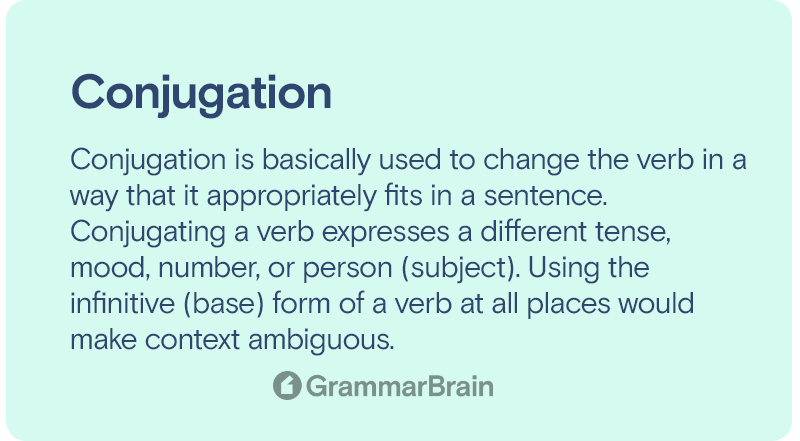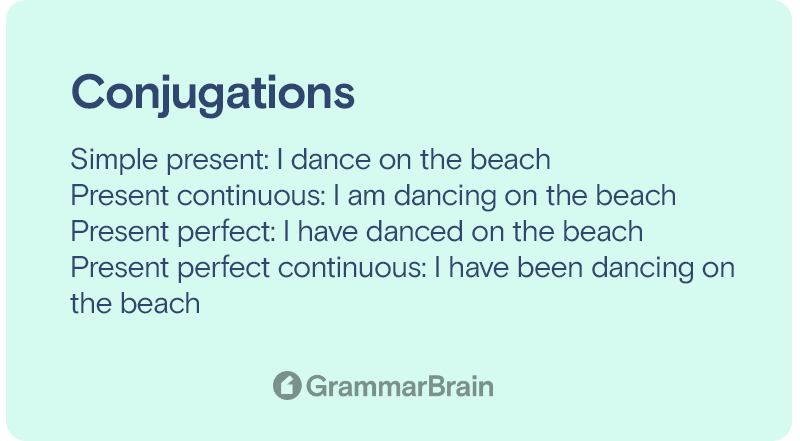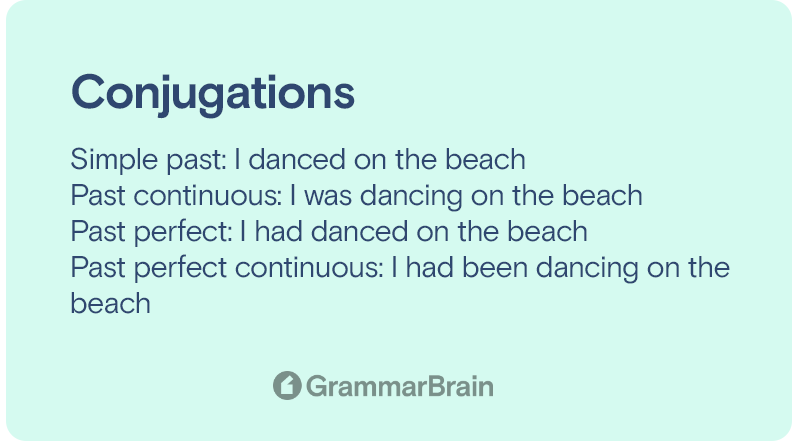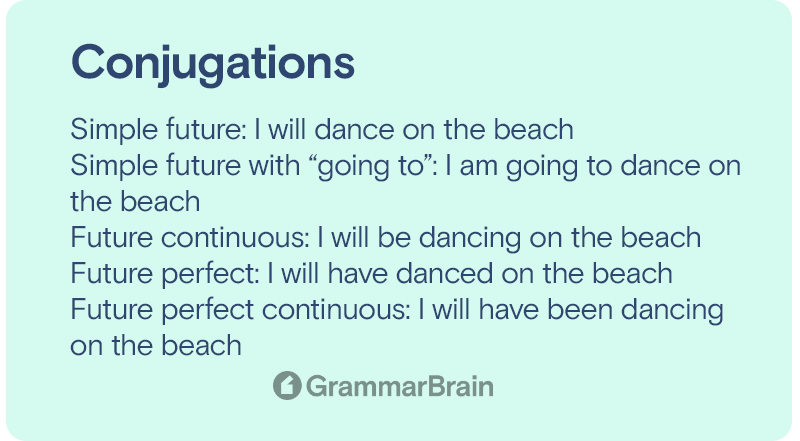What is conjugation? How does it work? Is there conjugation in English or only in other languages? These are all great questions that you may have when learning about conjugation. Learn the answers in this comprehensive guide on grammatical conjugation.
What exactly is conjugation?
The word conjugation is derived from a Latin word that means “join together”. Conjugations are basically derived forms of a verb. They are derived from their principal parts by inflection.
Thus, they are also called “verb inflection”.

When is conjugation required?
Conjugation is basically used to change the verb in a way that it appropriately fits in a sentence. Conjugating a verb expresses a different tense, mood, number, or person (subject). Using the infinitive (base) form of a verb at all places would make context ambiguous.
Some of the factors that will require the conjugation of a verb are as follows:
- Tense (simple present, simple past, simple future)
- Aspect (simple, progressive, or perfect)
- Number (singular or plural)
- Person (1st person, 2nd person, or 3rd person)
Conjugation of verbs is necessary when it comes to voices (active and passive) and tenses to make a grammatically meaningful sentence.
The idea of verb conjunctions is inevitably linked with tenses. Using the infinitive verb form alone would not be enough to reflect the tense or when a particular action occurs. Hence, the verb form needs to be conjugated to provide an essential context to the sentence.
How to conjugate regular verbs
The conjugation of weak verbs or regular verbs is fairly straightforward:
The past (V2) or past participle (V3) form of a verb can be simply obtained by adding d/ed/t to the present (V1) form (main form) of the verb.
These forms are used in the simple (except simple present and future), perfect, and perfect continuous tenses. The present form is used in simple present and simple future tenses.
Thus, Past/Past Participle Form = Present Form + d/ed/t.
The present participle (V4) can be obtained by adding “ing” to the present (V1) form of the verb. This form of the verb is used in the continuous tense.
Thus, present participle form = present form + ing.
These four forms are eventually used in all the tenses. The conjugation of regular verbs is called regular conjugation.
What are some examples of conjugating regular verbs?
Let us consider the base form of the regular verb: “dance”. The tense conjugations will be as follows:

Present tense conjugations:
- Simple present: I dance on the beach
- Present continuous: I am dancing on the beach
- Present perfect: I have danced on the beach
- Present perfect continuous: I have been dancing on the beach

Past tense conjugations:
- Simple past: I danced on the beach
- Past continuous: I was dancing on the beach
- Past perfect: I had danced on the beach
- Past perfect continuous: I had been dancing on the beach

Future tense conjugations:
- Simple future: I will dance on the beach
- Simple future with “going to”: I am going to dance on the beach
- Future continuous: I will be dancing on the beach
- Future perfect: I will have danced on the beach
- Future perfect continuous: I will have been dancing on the beach
How are irregular verbs conjugated?
Conjugating a weak verb is straightforward and can be easily applied to form sentences with appropriate tenses. However, the same is not the case for conjugating a strong verb or an irregular verb.
There is no definite rule to obtain the different forms of an irregular verb. Now, let us consider an example of the tense conjugation of an irregular verb. The conjugation of an irregular verb is also called irregular conjugation.
What are some examples of conjugating irregular verbs?
Let us consider the base form of an irregular verb: “to eat.” The irregular tense conjugations will be as follows:
Present tense conjugations:
- Simple present: I eat lunch
- Present continuous: I am eating lunch
- Present perfect: I have eaten lunch
- Present perfect continuous: I have been eating lunch
Past tense conjugations:
- Simple past: I ate lunch
- Past continuous: I was eating lunch
- Past perfect: I had eaten lunch
- Past perfect continuous: I had been eating lunch
Future tense conjugations:
- Simple future: I will eat lunch
- Simple future with “going to”: I am going to eat lunch
- Future continuous: I will be eating lunch
- Future perfect: I will have eaten lunch
- Future perfect continuous: I will have been eating lunch
Here, it is clear that the past form of the verb “eat” is “ate”, which is not formed by simply adding d/ed/t to the present form. Thus, different forms of irregular verbs don’t follow specific rules and are hence trickier to conjugate.
It can also be observed that tense conjugations tend to change the context and are critical to the meaning of the sentence. For example, the meaning and context of the sentences: “I dance on the beach” and “I danced on the beach” are not the same.
Verb conjugation according to numbers and person
As discussed earlier, verb conjugations aren’t simply used in different tenses, but are also necessary with the presence of other factors like number or person.
Let us consider an example to see how verb conjugation affects the subject:
For example, let’s consider the infinite (base) form of a verb: “to sing.” For this verb, the simple present conjugations for different subjects would be as follows:
- 1st person: I/We sing a song
- 2nd person: You sing a song
- 3rd person: He/She/It sings a song.
- 3rd person (They): They sing a song
Hence, verb conjugation, for the same tense, gets affected by the subject of the sentence.
Conjugations also affect numbers i.e., a verb would need to be conjugated based on the singularity or plurality of the verb.
Let us consider an example to see how verb conjugation affects numbers:
- I am going to the party
- They are going to the party
Hence, it can be observed that verb conjugation is done differently for singular and plural verbs.
Conjugation is unaffected by gender (male/female). Let us consider an example:
- He plays football
- She plays football
Thus, it can be seen that the same form of the verb is used in both cases.
Verb conjugation according to voices
The verb conjugation is also necessary when writing in different voices. Let us consider an example:
- Active voice: He is preparing breakfast
- Passive voice: Breakfast is being prepared by him
Hence, verb conjugation is necessary for voice.
What are the significant features of conjugation?
- Conjugation completely changes the context of the sentence and expresses several different concepts.
- Conjugation is necessary for voice (active and passive).
- Conjugation is affected by the subject or person of the sentence.
- Conjugation is unaffected by gender.
- Conjugation is necessary for tenses.
- Conjugation of regular verbs follows fairly straightforward rules and is called regular conjugation.
- Conjugation of irregular verbs doesn’t follow fixed rules and is called irregular conjugation.
FAQs
1. What is conjugation and why is it necessary?
Conjugations are applied only to verbs and are derived forms of verbs. They are necessary to provide context to create a meaningful sentence. They are used to show tense, aspect, mood, number, etc.
2. How many types of conjugations are there?
There are two types of conjugations:
- Regular conjugation: These are conjugations to regular verbs.
- Irregular conjugation: These are conjugations to irregular verbs.
3. Does conjugation affect gender or number?
No, conjugation does not affect gender. However, it affects numbers.
4. What are conjugated forms of words?
“Done,” “making,” and “has” are all conjugated forms.
5. How does conjugations work along with verbs and other words?
The conjugator recognizes infinitive like reflexive verbs and other negative forms as well as phrasal verbs.
Sources:
- Wikipedia – Grammatical conjugation
- Merriam-Webster Dictionary – Definition
- Writing Explained – What is Conjugation? Definition, Examples of Verb Conjugation
- Grammarly – Verb Conjugation—Grammar Rules
Inside this article
Fact checked:
Content is rigorously reviewed by a team of qualified and experienced fact checkers. Fact checkers review articles for factual accuracy, relevance, and timeliness. Learn more.
Core lessons
Glossary
- Abstract Noun
- Accusative Case
- Anecdote
- Antonym
- Active Sentence
- Adverb
- Adjective
- Allegory
- Alliteration
- Adjective Clause
- Adjective Phrase
- Ampersand
- Anastrophe
- Adverbial Clause
- Appositive Phrase
- Clause
- Compound Adjective
- Complex Sentence
- Compound Words
- Compound Predicate
- Common Noun
- Comparative Adjective
- Comparative and Superlative
- Compound Noun
- Compound Subject
- Compound Sentence
- Copular Verb
- Collective Noun
- Colloquialism
- Conciseness
- Consonance
- Conditional
- Concrete Noun
- Conjunction
- Conjugation
- Conditional Sentence
- Comma Splice
- Correlative Conjunction
- Coordinating Conjunction
- Coordinate Adjective
- Cumulative Adjective
- Dative Case
- Determiner
- Declarative Sentence
- Declarative Statement
- Direct Object Pronoun
- Direct Object
- Diction
- Diphthong
- Dangling Modifier
- Demonstrative Pronoun
- Demonstrative Adjective
- Direct Characterization
- Definite Article
- Doublespeak
- False Dilemma Fallacy
- Future Perfect Progressive
- Future Simple
- Future Perfect Continuous
- Future Perfect
- First Conditional
- Irregular Adjective
- Irregular Verb
- Imperative Sentence
- Indefinite Article
- Intransitive Verb
- Introductory Phrase
- Indefinite Pronoun
- Indirect Characterization
- Interrogative Sentence
- Intensive Pronoun
- Inanimate Object
- Indefinite Tense
- Infinitive Phrase
- Interjection
- Intensifier
- Infinitive
- Indicative Mood
- Participle
- Parallelism
- Prepositional Phrase
- Past Simple Tense
- Past Continuous Tense
- Past Perfect Tense
- Past Progressive Tense
- Present Simple Tense
- Present Perfect Tense
- Personal Pronoun
- Personification
- Persuasive Writing
- Parallel Structure
- Phrasal Verb
- Predicate Adjective
- Predicate Nominative
- Phonetic Language
- Plural Noun
- Punctuation
- Punctuation Marks
- Preposition
- Preposition of Place
- Parts of Speech
- Possessive Adjective
- Possessive Determiner
- Possessive Case
- Possessive Noun
- Proper Adjective
- Proper Noun
- Present Participle
- Prefix
- Predicate



